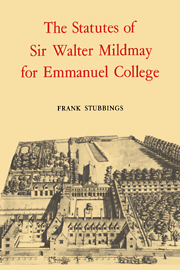Book contents
- Frontmatter
- Contents
- List of plates
- Preface
- Abbreviations
- Introduction
- The historical background
- The manuscripts
- The Statutes of Sir Walter Mildmay, Knight, Chancellor of the Exchequer and one of Her Majesty's Privy Council, authorised by him for the government of Emmanuel College, founded by him
- The College orders of 1588
- Statuta D. Gualtheri Mildmaii Militis Cancellarii Scaccarii et Regineae Maiestati a consiliis: quae pro administratione Collegii Emmanuelis ab eo fundati sancivit
- Statutum de Camera Consanguineis fundatoris reservand
- De mora sociorum in Collegio, et de gradu Doctoratus in sacra Theologia Susripiendo
- Index
- Plate section
The Statutes of Sir Walter Mildmay, Knight, Chancellor of the Exchequer and one of Her Majesty's Privy Council, authorised by him for the government of Emmanuel College, founded by him
Published online by Cambridge University Press: 03 March 2010
- Frontmatter
- Contents
- List of plates
- Preface
- Abbreviations
- Introduction
- The historical background
- The manuscripts
- The Statutes of Sir Walter Mildmay, Knight, Chancellor of the Exchequer and one of Her Majesty's Privy Council, authorised by him for the government of Emmanuel College, founded by him
- The College orders of 1588
- Statuta D. Gualtheri Mildmaii Militis Cancellarii Scaccarii et Regineae Maiestati a consiliis: quae pro administratione Collegii Emmanuelis ab eo fundati sancivit
- Statutum de Camera Consanguineis fundatoris reservand
- De mora sociorum in Collegio, et de gradu Doctoratus in sacra Theologia Susripiendo
- Index
- Plate section
Summary
Preface
It is an ancient institution in the Church of God, and a tradition from the earliest times, that schools and colleges be founded for the education of young men in all piety and good letters and especially in Holy Writ and Theology, that being thus instructed they may thereafter teach true and pure religion, refute all errors and heresies, and by the shining example of a blameless life excite all men to virtue. For thus we read in the sacred history that the sons of the prophets at Naioth, Gilgal, Bethel and Jericho were brought up by those great and famous prophets Samuel, Elijah and Elisha to preach the name of God and instruct the people in true religion. And it is recorded in the Acts of the Apostles that at Jerusalem there were many synagogues, belonging nigh one to every nation, to which there flowed together men from almost every part of the world as to some mart of religion and learning and virtue, among whom Saul of Tarsus (that was afterward called Paul), a most chosen instrument of the Lord and the teacher of the Gentiles, is said to have sat at the feet of the reverend Gamaliel. For men that were inspired by the divine prompting of the spirit did understand that the light of the Gospel could not be spread abroad to all posterity to the glory of God and to the salvation of men but there were created and decked out in His Church, as it were in the garden of Paradise, some seed-plots of those most noble plants of Theology and right good learning, from the which such as had grown to maturity …
- Type
- Chapter
- Information
- The Statutes of Sir Walter Mildmay , pp. 25 - 98Publisher: Cambridge University PressPrint publication year: 1983



